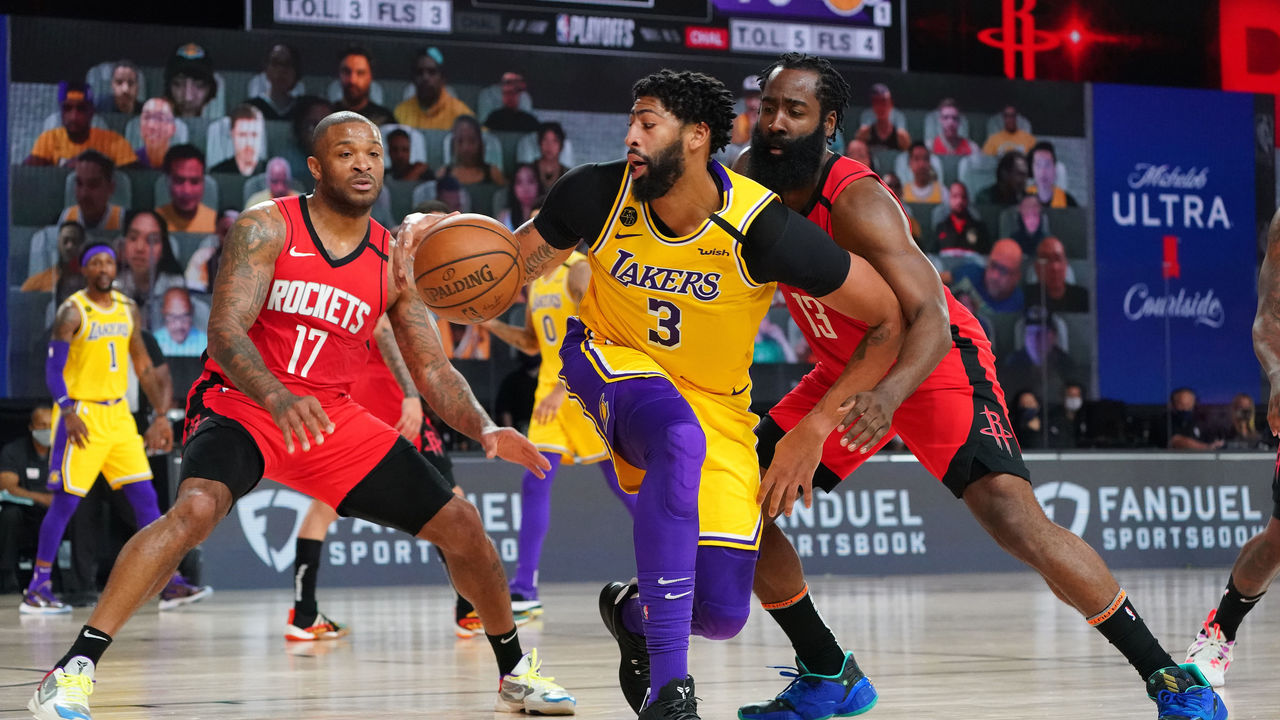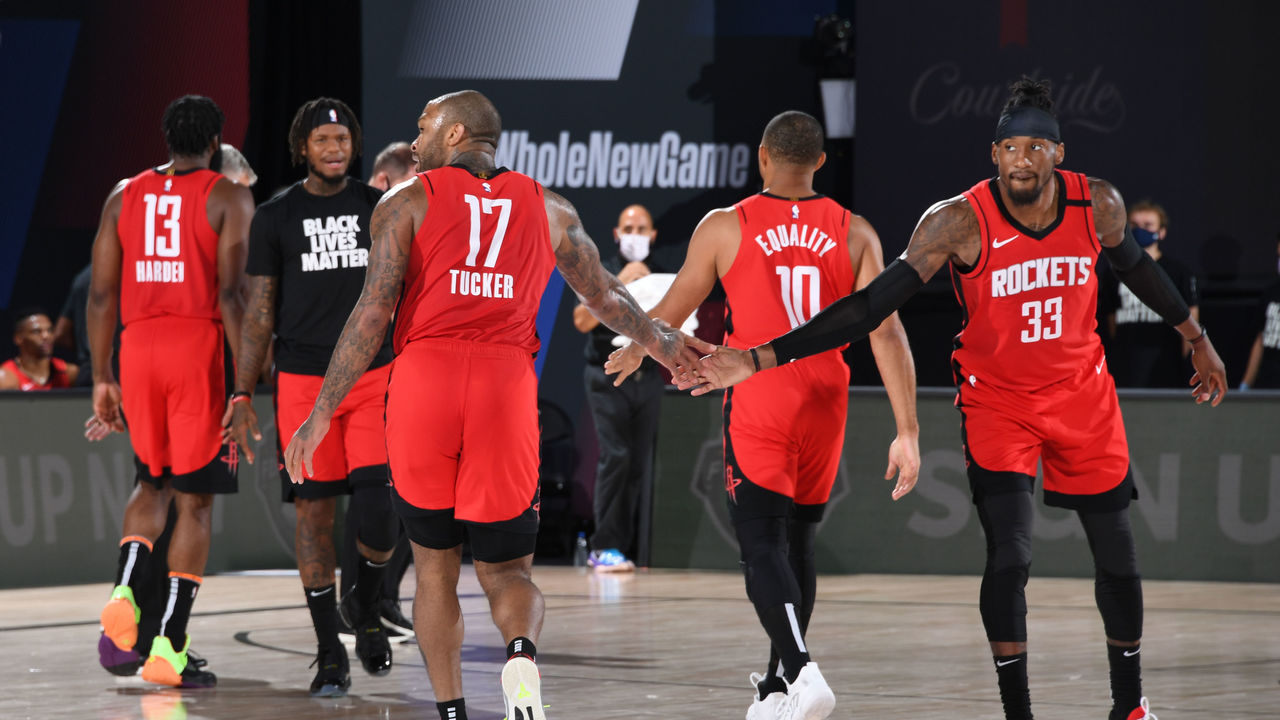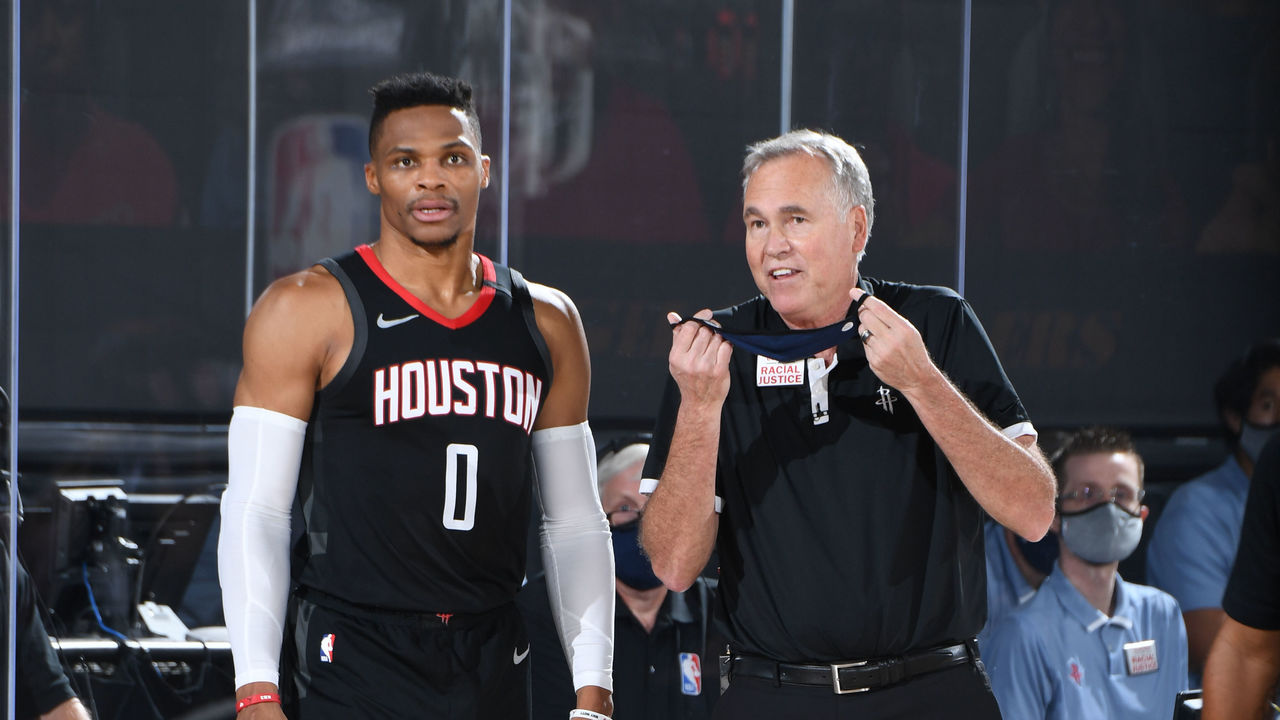What the Rockets' burnout says and doesn't say about their approach
For the balance of James Harden's tenure in Houston, the Rockets have been the most polarizing team in the NBA. People have watched them with a kind of morbid fascination, either excitedly wondering or anxiously worrying about what their radical basketball philosophy portends for the future of the league.
From Harden's foul-baiting play style, to the iso-heavy offense that so often amounts to endless dribbling before a step-back while four other players stand around and watch, to Daryl Morey's coldly analytical approach to team-building, to the way the team has tried to mathematize basketball by pushing the concept of shot-spectrum optimization to its extreme, the Rockets represent the fault line in a basketball culture war. Depending on who you ask, they are either revolutionaries or heretics. Their setbacks aren't treated as mere organizational failures, but as failures of ideology.
That polarization reached a new level this season when Morey pushed all of his chips into the small-ball pot, trading center Clint Capela for wing Robert Covington to establish a rotation that featured no player taller than 6-foot-7 and pressed 6-foot-5 P.J. Tucker into duty as a full-time five.
Before the shutdown, Jared Dudley told ESPN's Zach Lowe that the outcome of the Rockets' experiment would have huge stakes: if they succeeded, it would help bring about the extinction of the NBA big man. After Houston's Game 1 win over the top-seeded Los Angeles Lakers in the Western Conference semifinals, Draymond Green - the league's prototypical small-ball center - expressed a similar sentiment:
All big centers not named Joel, KAT, and Joker should be cheering hard for the lakers right now. If Houston take this series it’s going to hurt the value of the big man even more.
— Draymond Green (@Money23Green) September 5, 2020
Perhaps those who still believe in the value of bigs - and thought the experiment was doomed to fail from the start - felt vindicated when the Lakers won four straight to send Houston packing. They wouldn't necessarily be wrong, though the reality is a bit more nuanced than a lot of the discourse would suggest.
The Rockets lost to a very good team for a handful of reasons, many of which had nothing to do with their lack of frontcourt size. Even in the midst of their second-round flameout, the Rockets changed the terms of engagement, forcing the Lakers to completely mothball their preferred two-big lineups and excise traditional centers from their rotation. It just happened that L.A. was perfectly fine without those centers, which owed largely to Anthony Davis but also in part to unexpectedly great performances from lineup-fillers like Markieff Morris and Rajon Rondo.
Covington was in many ways a perfect addition to Houston's system. On top of his gravity as a high-volume spot-up threat, he's an objectively better defender than Capela. Despite the Rockets' slight drop-off in defensive rebounding and rim protection, they defended considerably better as a team after the trade, and there's scant evidence they would've been any better off had they kept Capela.
When things clicked for Houston, it could look like the next frontier of basketball. At one end of the floor, like-sized defenders switching across every position, sealing off gaps, and goading their opponents into attacking in isolation or forcing post-ups against deceptively stout defenders. At the other end, pristine floor spacing that allowed the game's best one-on-one player to waltz to the basket, bomb pull-up threes, or trigger help rotations that opened up the most efficient shots for his teammates: catch-and-shoot triples from the corners.
But the sheer effort and physical resilience required to reach that peak level were unsustainable. Saddling defenders with constant size mismatches proved too taxing. Even Tucker, the indefatigable boulder who anchored Houston's defense all year, looked exhausted by the end of the series. The Rockets got destroyed on the glass, grabbing just 43.5% of available rebounds. Their defense fell apart after Game 1, unable to stop Los Angeles from scoring inside. The Lakers shot 76.1% in the restricted area, and the Rockets struggled mightily to do the same, generating about 12 fewer points per game at the rim and 14 fewer points in the paint.

The concept of small ball can be a bit of a misnomer. Since the dawn of the Golden State Warriors' dynasty-spurring "Death Lineup" (which was unlocked by Green's ability to man the five as a 6-foot-7 playmaking wing), there's been a sense that the NBA as a whole has fallen in love with downsizing. It would be more accurate to say the league has fallen in love with versatility.
The best-case scenario is really to get size and versatility in the same package, and the Lakers have that in Anthony Davis. At 6-foot-11, with the ability to handle and shoot, initiate and finish, create advantages in the half court and beat anyone down the floor in transition, and protect the rim and switch out on the perimeter, Davis is a skeleton key that can unlock any type of lineup. Against the diminutive Rockets, he brought to bear all the advantages of playing a traditional center with none of the drawbacks.
One thing this postseason has made plain is that versatility is as much of a collective trait as it is an individual one. When the cracks started to show for the Rockets, there was no big adjustment for them to make. They, like the Milwaukee Bucks, were incapable of playing any way other than how they already did. Houston constructed a team full of ostensibly versatile players that collectively lacked any versatility of style.
Maybe things would've been different if Russell Westbrook, who operated as a rim-rampaging menace in the two months before the shutdown, didn't test positive for COVID-19 and then strain his quadriceps before the start of the playoffs. Maybe things would've been different if Danuel House, an important 3-and-D cog in the Rockets machine, hadn't gotten himself booted from the bubble for ... breaking protocol. Maybe things would've been different if a big man like Tristan Thompson was bought out at the deadline and signed with Houston on the cheap. But a lot of the same problems would've persisted.
When in past years the Rockets drained Harden's battery by asking him to create everything for them on offense, this year their system broke down when the Lakers' excellent defense blitzed Harden to get the ball out of his hands, then recovered and rotated in time to run Houston's role players off the 3-point line. This loss wasn't a case of the Rockets being damned by their high-variance approach; this wasn't them going ice-cold at the worst time and missing 27 straight threes. They actually shot quite well from deep (36.8%) on a high volume of attempts (40.8) in the series. The bigger issue was that too many of their complementary players couldn't do anything when the Lakers forced them to put the ball on the floor.

Westbrook was supposed to be the answer to that problem but couldn't do anything against L.A. in the half court. The Lakers' defenders freely ignored him to load up on Harden, and Westbrook's inability to shoot and unwillingness to cut off-ball allowed them to get away with it. He couldn't capitalize on four-on-three situations and repeatedly failed to get all the way to the basket even when attacking a scrambled defense. The upshot was that the Lakers successfully forced control of Houston's offense out of Harden's hands and into Westbrook's. The latter finished the series with the team's highest usage rate (32.8%) and lowest true-shooting percentage (47.9%).
Harden and Westbrook never achieved symbiosis and didn't seem interested in doing so. They largely operated independently of each other, ranking first and second in the league in isolation frequency. Defensively, they compounded each other's foibles with their shared propensity for ball-watching, reaching in rather than moving their feet on the perimeter, and lollygagging in transition. With the two of them on the floor together against the Lakers, Houston was outscored by 12.7 points per 100 possessions. When Harden played without Westbrook, the Rockets outscored L.A. by 5.5 points per 100.
Even given his disappointing Game 4 performance when he shot 2-of-11 from the field as the Rockets fell into a 3-1 hole, it's hard to lay this disappointment at Harden's feet. He averaged 29.4 points and 7.2 assists on 66.4% true shooting in the series. He more than satisfied his role as a post-stopper on defense and a hyper-efficient scorer and double-team magnet on offense. Time after time, he created advantages his teammates simply weren't able to capitalize on.
That's not to say Harden is totally blameless. At some point, he needs to break the habit of spending his off-ball possessions chilling near half court, making no attempt to engage in the action. He still gets guarded out there, but even if there's a benefit to letting the rest of the Rockets play four-on-four, the benefit of having Harden cut, screen, and relocate for threes would undoubtedly be greater. He shouldn't be taking 85% of his threes off the dribble while playing alongside another high-end drive-and-kick creator. It might also behoove Harden to get back in touch with his mid-range game, since his complete abandonment of that space allowed playoff defenses to funnel him into his dead zone and jail him there.
But this result shouldn't be a referendum on the Rockets' analytically oriented team-building model. In truth, the decision that sunk them was one that had nothing to do with analytics and everything to do with interpersonal dynamics: Harden insisted he couldn't play with Chris Paul anymore, so the team, beholden to its generational superstar, traded Paul for a far less efficient player who's a dramatically worse on-court fit next to Harden.
Morey has always balked at any notion that he set out to build a revolutionary team or render the NBA big man obsolete. He insists he's simply trying to put the best team possible around Harden. To that effect, trading Paul for Westbrook registers as his biggest failure to date. And that's without even accounting for the two first-round picks and two pick swaps he sent out in the deal.

Harden is still good enough to operate as the centerpiece of a title team. Houston was one game and perhaps one sturdier Paul hamstring away from beating the Kevin Durant-Steph Curry-Klay Thompson-Draymond Green Warriors - arguably the most talented team ever assembled - in the West final two years ago. Harden hasn't gotten any worse since then, but the Rockets' championship prospects have nonetheless dimmed considerably.
It's unclear where they can even go from here. Westbrook has three years and $130 million remaining on what looks like an immovable contract. The Rockets have virtually no young players or draft picks to use as trade chips, and they're butting up against the luxury tax at a time when penny-pinching owner Tilman Fertitta is seeing his hospitality businesses suffer due to COVID-19. It sure feels as though they're running out of cards to play.
According to ESPN's Tim MacMahon, the team has no intention of straying from its super-small identity next season. Mike D'Antoni, however, won't be leading the charge. The two-time Coach of the Year winner, who failed to reach an extension agreement with Fertitta and Co. last summer, has informed the team that he's moving on. The type of coach the Rockets replace him with should tell us a lot about what they think of the remainder of Harden's prime.
Morey - should Fertitta keep him aboard - has his work cut out for him. But regardless of what happens from here, both he and D'Antoni deserve credit for their willingness to push the envelope and take big swings. Even if their gambits haven't succeeded to the fullest extent, the league is better for them. This Houston team won't be the last of its kind. It's not an easy blueprint to follow - players like Tucker and Covington don't grow on trees - but there will surely be others who try.
Revolutionaries are always looked upon more favorably in retrospect than they are in the moment, and perhaps this is D'Antoni's NBA destiny. Like his Seven Seconds or Less Phoenix Suns, the 6-foot-7-or-less Rockets may be the type of team that, despite never winning a championship itself, paves the way for future champions built atop its principles.